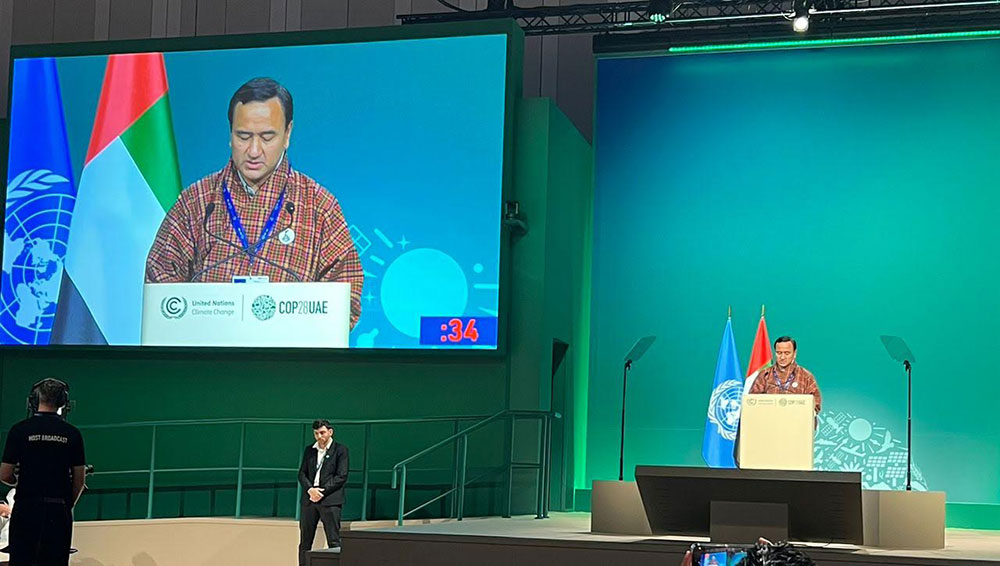…the national statement demands adequate, accessible and sustainable financing
YK Poudel
Dubai, UAE—As the 28th Conference of Parties (COP28) nears conclusion, Energy and Natural Resources secretary and the Head of Delegation (technical negotiations), Karma Tshering, stressed the need for immediate and robust global action to address the escalating climate crisis.
The national statement by the delegation head on December 9, makes a strong claim on climate finance that it must be adequate, predictable, easily accessible, and sustainable based on the priorities and needs of the most vulnerable countries. “There is no better time than now to deliver the commitments,” he said.
The COP28 in Dubai has reached the second week—the technical and global negotiations and discussions are under process.
“We have come with high expectations from COP28. From the first Global Stocktake (GST), we look to course correction on actions to limit the temperature rise below 1.5o Celsius and bring about a step change in how we drive adaptation and the means of implementation,” he said.
Guided by hereditary monarchs, Bhutan consistently leads in environmental stewardship, pioneering carbon neutrality. Their commitment is evident in the country being one of the first nations to pledge global leadership.
Secretary Karma Tshering thanked the development partners as the nation prepares to graduate from the Least Developed Countries (LDCs) category. “We reiterate our submissions on mountain issues including the call for a dialogue on mountains and climate change.”
According to the secretary, in spite of the efforts from the country, as a highly vulnerable country in a fragile mountain ecosystem and a high dependence on climate-sensitive sectors, Bhutan is bearing the brunt of climate change.
“We are witnessing increasing occurrences of flash floods, landslides, and erratic rainfalls during the summer, while winter is getting warmer with disappearing water sources and snow,” he said. “This affects the livelihoods of not just our own communities but also threatens millions of livelihoods in the communities downstream.”
The latest IPCC reports confirm that the slightest temperature rise will have detrimental effects on mountain regions, particularly the glaciers and cryosphere. Warming in mountain regions is several times faster than the global average, posing significant risks including GLOF.
Reaffirming its commitment, Bhutan has submitted the first National Adaptation Plan, Adaptation Communication, LTS and elaborated low emission development strategies (LEDS).
In all these, the country has interlinked all sectors and synergies between adaptation and mitigation to ensure safeguarding and climate proofing development efforts.
Bhutan launched the National Carbon Registry and Bhutan Climate Fund which are expected to facilitate the nation’s strategic entrance into the carbon market.
The national statement closes by outlining Bhutan’s demand from world leaders, investors, governments, multinational donors, International NGOs, and the private sectors to reinforce the much-needed climate finance commitments including the USD 100 billion commitment by 2025.


